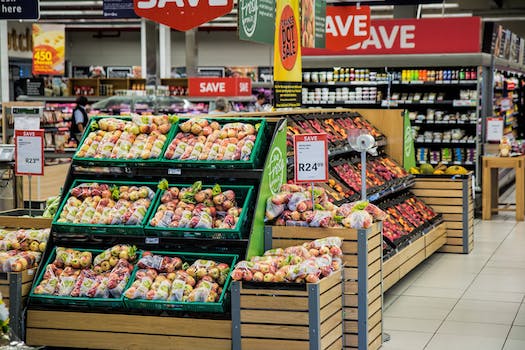How To Start A Grocery Business
“From concept to checkout: A step-by-step guide to launching your own successful grocery business.”
Introduction
Starting a grocery business can be a lucrative venture, especially in today’s fast-paced world where people are always on the go and looking for convenient ways to shop for their daily needs. However, like any other business, starting a grocery store requires careful planning and execution. In this article, we will discuss the essential steps you need to take to start a successful grocery business.
Conducting Market Research
Starting a grocery business can be a lucrative venture, but it requires careful planning and research. One of the most important steps in starting a grocery business is conducting market research. This involves gathering information about the local market, including the competition, customer demographics, and consumer preferences.
The first step in conducting market research is to identify the target market. This involves determining the age, income, and lifestyle of the potential customers. For example, if the grocery store is located in a college town, the target market may be young adults with limited budgets. On the other hand, if the store is located in an affluent neighborhood, the target market may be families with higher incomes.
Once the target market has been identified, it is important to research the competition. This involves visiting other grocery stores in the area and observing their products, prices, and customer service. It is also important to research online grocery stores and delivery services, as these may be competitors as well.
In addition to researching the competition, it is important to gather information about consumer preferences. This can be done through surveys, focus groups, or online research. Questions to consider include what types of products customers are looking for, what price points they are willing to pay, and what factors influence their purchasing decisions.
Another important aspect of market research is analyzing the local economy. This involves researching the local job market, population growth, and economic trends. For example, if the local economy is experiencing a downturn, it may not be the best time to start a new business.
Once all of this information has been gathered, it is important to analyze the data and use it to make informed decisions about the grocery business. This may involve making changes to the product offerings, pricing strategy, or marketing plan.
In addition to conducting market research, there are other important steps to take when starting a grocery business. These include developing a business plan, securing funding, and obtaining the necessary licenses and permits.
Developing a business plan involves outlining the goals and objectives of the grocery business, as well as the strategies for achieving them. This may include a marketing plan, financial projections, and an analysis of the competition.
Securing funding is also an important step in starting a grocery business. This may involve obtaining a loan from a bank or other financial institution, or seeking investment from private investors.
Finally, obtaining the necessary licenses and permits is essential for starting a grocery business. This may include a business license, food service permit, and health department inspection.
In conclusion, starting a grocery business requires careful planning and research. Conducting market research is an important step in this process, as it provides valuable information about the local market, competition, and consumer preferences. By using this information to make informed decisions, entrepreneurs can increase their chances of success in the grocery business.
Creating a Business Plan

Starting a grocery business can be a lucrative venture, but it requires careful planning and execution. One of the most important steps in starting a grocery business is creating a business plan. A business plan is a roadmap that outlines your goals, strategies, and financial projections for your business. In this article, we will discuss the key elements of a grocery business plan and how to create one.
1. Executive Summary
The executive summary is the first section of your business plan and should provide a brief overview of your business. It should include your mission statement, business goals, and a summary of your financial projections. This section should be concise and compelling, as it will be the first thing potential investors or lenders will read.
2. Market Analysis
The market analysis section should provide an overview of the grocery industry in your area. It should include information on your target market, competitors, and industry trends. This section will help you identify opportunities and challenges in the market and develop strategies to address them.
3. Products and Services
In this section, you should describe the products and services you will offer in your grocery business. This may include fresh produce, meat, dairy, bakery items, and other grocery staples. You should also describe any additional services you will offer, such as delivery or catering.
4. Marketing and Sales Strategies
Your marketing and sales strategies should outline how you will promote your grocery business and attract customers. This may include advertising, social media marketing, and promotions. You should also describe your pricing strategy and how you will compete with other grocery stores in the area.
5. Operations Plan
The operations plan should describe how your grocery business will operate on a day-to-day basis. This may include information on your suppliers, inventory management, staffing, and customer service. You should also include information on any equipment or technology you will need to run your business.
6. Financial Projections
The financial projections section should provide a detailed analysis of your expected revenue, expenses, and profits over the next few years. This will help you determine how much funding you will need to start and grow your grocery business. You should also include a break-even analysis and cash flow projections.
Creating a business plan can be a daunting task, but it is essential for the success of your grocery business. Here are some tips to help you create a strong business plan:
– Research the grocery industry in your area and identify opportunities and challenges.
– Be realistic in your financial projections and include a contingency plan for unexpected expenses.
– Seek feedback from trusted advisors, such as a mentor or business coach.
– Update your business plan regularly as your business grows and evolves.
In conclusion, creating a business plan is a crucial step in starting a grocery business. It will help you identify your goals, strategies, and financial projections, and provide a roadmap for your business. By following the tips outlined in this article, you can create a strong business plan that will set you up for success in the grocery industry.
Securing Funding and Licenses
Starting a grocery business can be a lucrative venture, but it requires careful planning and preparation. One of the most important steps in starting a grocery business is securing funding and licenses. In this article, we will discuss the steps you need to take to secure funding and licenses for your grocery business.
Firstly, you need to determine how much money you need to start your grocery business. This will depend on the size of your store, the products you want to sell, and the location of your store. You can create a business plan to help you determine the startup costs and projected revenue for your grocery business.
Once you have determined how much money you need, you can start looking for funding options. You can consider getting a loan from a bank or credit union, or you can look for investors who are interested in your business idea. You can also consider crowdfunding platforms to raise money for your grocery business.
When applying for a loan, you will need to provide a detailed business plan, financial projections, and other documents that show your ability to repay the loan. You may also need to provide collateral, such as property or equipment, to secure the loan.
If you are looking for investors, you will need to create a pitch deck that outlines your business idea, the market opportunity, and your financial projections. You can also attend networking events and pitch competitions to meet potential investors.
Crowdfunding platforms can be a great way to raise money for your grocery business. You can create a campaign on a crowdfunding platform and offer rewards to people who contribute to your campaign. You can also use social media to promote your campaign and reach a wider audience.
Once you have secured funding for your grocery business, you need to obtain the necessary licenses and permits. The licenses and permits you need will depend on the location of your store and the products you want to sell.
You will need to register your business with the state and obtain a tax ID number. You may also need to obtain a business license and a seller’s permit. If you plan to sell alcohol, you will need to obtain a liquor license.
You will also need to comply with health and safety regulations. You will need to obtain a food handler’s permit and ensure that your store meets the health and safety standards set by the local health department.
In addition to licenses and permits, you will need to obtain insurance for your grocery business. You will need liability insurance to protect your business from lawsuits and property insurance to protect your store and inventory.
In conclusion, starting a grocery business requires careful planning and preparation. Securing funding and licenses is an important step in starting a grocery business. You need to determine how much money you need, look for funding options, and obtain the necessary licenses and permits. With the right preparation and hard work, you can start a successful grocery business.
Finding a Suitable Location
Starting a grocery business can be a lucrative venture, but it requires careful planning and execution. One of the most important aspects of starting a grocery business is finding a suitable location. In this article, we will discuss some tips on how to find the perfect location for your grocery business.
Firstly, it is important to consider the demographics of the area where you plan to open your grocery store. You should research the population density, age range, income level, and lifestyle of the people in the area. This information will help you determine the type of products and services that will be in demand in that area. For example, if the area has a high population of young families, you may want to stock up on baby products and healthy snacks.
Secondly, you should consider the competition in the area. Are there already established grocery stores in the area? If so, what type of products and services do they offer? You should conduct a thorough analysis of the competition to identify any gaps in the market that you can fill. For example, if there are no organic grocery stores in the area, you may want to consider offering a range of organic products.
Thirdly, you should consider the accessibility of the location. Is the location easily accessible by public transport? Is there ample parking space for customers? Is the location visible from the main road? These are all important factors to consider when choosing a location for your grocery business. You want to make sure that your store is easily accessible to customers and that they can find it easily.
Fourthly, you should consider the size of the location. How much space do you need to stock your products and provide a comfortable shopping experience for your customers? You should also consider the layout of the store and how you will display your products. A well-designed store layout can help attract customers and increase sales.
Fifthly, you should consider the cost of the location. How much rent or lease will you have to pay for the location? You should also consider any additional costs such as utilities, insurance, and taxes. It is important to have a clear understanding of the costs involved in running your grocery business to ensure that it is financially viable.
Lastly, you should consider the potential for growth in the area. Is the area growing or declining in population? Are there any new developments or projects planned for the area? You want to choose a location that has the potential for growth and expansion in the future.
In conclusion, finding a suitable location is a crucial step in starting a grocery business. You should consider the demographics of the area, the competition, accessibility, size, cost, and potential for growth when choosing a location. By carefully considering these factors, you can find the perfect location for your grocery business and set yourself up for success.
Sourcing Products and Suppliers
Starting a grocery business can be a daunting task, but with the right approach, it can be a rewarding venture. One of the most important aspects of starting a grocery business is sourcing products and suppliers. In this article, we will discuss some tips on how to source products and suppliers for your grocery business.
The first step in sourcing products and suppliers is to determine what products you want to sell in your grocery store. You need to decide on the type of grocery store you want to open, whether it is a specialty store or a general store. Once you have decided on the type of store, you can then start researching the products that you want to sell.
One of the best ways to source products is to attend trade shows and exhibitions. These events are a great way to meet suppliers and manufacturers and to see their products firsthand. You can also attend seminars and workshops to learn more about the products and the industry.
Another way to source products is to visit other grocery stores and supermarkets. This will give you an idea of what products are popular and what products are not. You can also talk to the store owners and managers to get their advice on sourcing products and suppliers.
Once you have identified the products that you want to sell, you need to start looking for suppliers. One of the best ways to find suppliers is to search online. There are many online directories and marketplaces that list suppliers and manufacturers. You can also use social media platforms to connect with suppliers and manufacturers.
When looking for suppliers, it is important to consider the quality of the products, the price, and the delivery time. You should also consider the reputation of the supplier and their customer service. It is important to work with suppliers who are reliable and who can deliver the products on time.
Another important aspect of sourcing products and suppliers is negotiating prices. You should always try to negotiate the best price possible, but you should also be realistic. You need to consider the cost of the products, the delivery time, and the quality of the products. You should also consider the profit margin that you want to make on the products.
Once you have found the right suppliers, you need to establish a good working relationship with them. You should communicate regularly with your suppliers and keep them informed of any changes in your business. You should also pay your suppliers on time and be respectful of their time and resources.
In conclusion, sourcing products and suppliers is an important aspect of starting a grocery business. You need to research the products that you want to sell, attend trade shows and exhibitions, and visit other grocery stores to get an idea of what products are popular. You also need to search online for suppliers and manufacturers, negotiate prices, and establish a good working relationship with your suppliers. With the right approach, you can source high-quality products and reliable suppliers for your grocery business.
Conclusion
Starting a grocery business requires careful planning, research, and execution. It is important to identify your target market, location, and suppliers. You should also create a business plan, obtain necessary licenses and permits, and secure funding. Building a strong brand and providing excellent customer service are also crucial for success in the competitive grocery industry. With dedication and hard work, starting a grocery business can be a rewarding and profitable venture.






